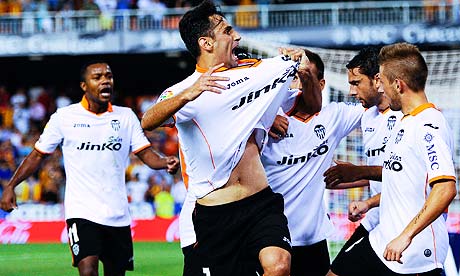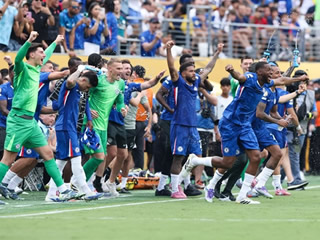Valencia's stray dogs come out fighting after Swansea kicking
Posted Tuesday, September 24, 2013 by theguardian.com
Forced to hide from angry fans after their midweek thrashing, the troubled club's players emerged from the dark with a fine win

Valencia's Jonas Goncalves celebrates after scoring the opening goal against Sevilla at the Mestalla.
On one side of the divide they didn't know it but they stood just metres apart, a metal gate between them: the side door at Mestalla. It was dark in the car park under the stand and a handful of Valencia players shifted uneasily, leaning in and listening through the slats to the angry shouting on the other side. Mercenaries! Shameless! Not fit to wear the shirt! Momentarily trapped, they fiddled with their phones and whispered in small groups as they waited for the all-clear to step on to the street or climb behind the wheels of their cars. When eventually the captain, Ricardo Costa, ventured out to face the fans, he went alone. You tell them, they said; you tell your team-mates how we feel.
They could hear it for themselves. During the match, supporters had whistled and whipped out the white hankies for a pañolada or hanky-wave, that classic symbol of discontent. Now, back inside the stadium, along the concrete corridor and into the media area, a security guard appeared and warned the visitors' manager that it wouldn't be easy to get out. Visiting players puffed out their cheeks: wow, wouldn't want to be in their shoes.
By the side door, the car park entrance where players waited, there were a handful of fans; at the main gate, the entrance to the directors' box, there were 1,500 of them and they were revolting. You could hear them from the press room where Valencia's manager, Miroslav Djukic, spoke. "I'm not worried about my job but I am worried about the way we're playing," said the man who played for the club for six years and took over as manager in the summer, joining from Valladolid. "I feel a great sadness."
The morning papers delivered their verdicts. "Ridiculous", "awful", "a rag doll", "chaos", "no brains", "soulless", "no football", "a headless chicken". The only thing a skinny dog attracts is fleas, as they say. "And Valencia," wrote Conrado Valle in AS, "is a stray greyhound with no collar and no food, just walking around awaiting death." "You can lose," insisted Mario Kempes, the club's most emblematic former player, "but you can't lose like that: that was disrespectful to an institution like Valencia." As if to rub it in, they had even had two Uefa Cups taken away: the 1962 and 1963 Fairs Cups no longer officially count. In one Valencia newspaper, Julián Montoro wrote: "We love [Djukic], he is one of us, but the team is dead and so is he."
But that was then and this is now. That was Thursday night; three days on and things look different. There is relief on Monday morning, a new life; "good vibrations", one pundit says. On Thursday night, Valencia lost 3-0 to Swansea and it was a crisis. On Sunday night they won 3-1 and it was a collective catharsis.
No one was, or is, under any illusions that the club's problems run deeper. However much Djukic described Valencia as a "sleeping giant" that could compete with Madrid and Barcelona, they know that they can't. This summer Roberto Soldado departed for Spurs, following Jordi Alba, Juan Mata, David Villa and David Silva out of the door. That the policy doesn't work on the pitch is no surprise; but it has not even worked that well off the pitch, either. The legacy of Juan Soler's disastrous presidency weighs too heavily. Over the last decade they have sold €134m worth of players, sure, but they have spent €343m, despite their signings slowing to a virtual standstill, and paid €52m just in commissions.
They still have two stadiums – one they can't sell and one they can't afford to finish building – and a debt of €276m with the nationalised bank, Bankia. The Valencian government, effectively the club's owners, are no longer prepared to do anything more than collect on their debt. This summer Valencia didn't sign Iago Aspas because they couldn't afford €10m. And last season, Ernesto Valverde had seen them improve steadily after a terrible start with Mauricio Pellegrino but he did not continue, at least in part because institutional instability, with the president Manolo Llorente departing, left him unsure who to negotiate with.
Some of the players who were left were divided; others thought they were better than they are. The new manager could hardly believe the dressing room he encountered. "I can't see any stars here," Djukic said. A poll showed that almost 90% of fans blamed the players not the coach; the chants were directed their way not his and fans at the north end of Mestalla held a banner that declared: "We'll always support you." But Thursday's defeat hurt and Djukic was still on edge. Valencia had taken fewer shots than any other team in La Liga and conceded more than any other. They had lost four games in a row for the first time in 14 years.
There were reports that Valencia's president, Amadeo Salvo, had spoken to Quique Sánchez Flores about taking over. And Djukic admitted that Valencia's players feared what they would encounter at Mestalla on Sunday night: "We were worried about how the fans would react," he said. Lose against Sevilla and he would be sacked. And the man who was going to slip the sword between the shoulder blades was Unai Emery, Valencia's former manager, a man with a score to settle after he was sacked following three consecutive years of finishing third.
Only it wasn't Emery; it might not be anyone at all. Instead, it is Emery who might be in trouble: Sevilla sit bottom of the table thanks to their worst start for 55 years, after Valencia beat them 3-1. Djukic was safe. This time Valencia's fans departed happy. At the end of the match Salvo insisted: "No matter what happens Djukic will continue until the end of the season." "We knew that we would change our 'face' but there was so much pressure," the Serbian manager said. "This should be a turning point for us." "Safe," cheered the cover of Super Deporte. "The team responded at a critical moment and took a step forward."
They did so right from the start, flying out, direct, fast and determined: going straight for the opposition, bombing forward. Djukic had wondered aloud why a talented team could not string three passes together, pointing at the pressure, the special demands at Valencia. Others suggested that the players just don't care enough. Andrés Guardado had demanded eggs, bollocks, but few seemed to have them. On Sunday night they did. They released the ball quicker, opening the pitch out more, and they had racked up five shots before the quarter-hour. By the end it was 26 to Sevilla's eight. Postiga was tireless, Éver Banega was higher up the pitch, where his incisive but risky passing is more dangerous for the opposition than for his own side (he has given the ball away more than anyone else in the league), and then there was Jonas. The Brazilian put Valencia 1-0 up, Kévin Gameiro made it 1-1 just after half time, and Jonas and Víctor Ruíz completed the scoring: 3-1. "Jonas revives Djukic," cheered Marca. "Jonas rescues Djukic," agreed El Mundo Deportivo.
Yet arguably the player who had done most to rescue him was Fede Cartabia, a 21-year-old Argentinian who arrived in the city at the age of 12 but is playing his first season in the first team. He had been sacrificed following Adil Rami's red card against Swansea but on Sunday night he provided the first and ran at Sevilla constantly, always a danger. Dynamic and daring, Fede was not even a regular in the youth team when Djukic arrived but the Serb knew he was good and he had seen him play lots of times before – in the same team as his son. "I'm grateful for the chances the manager has given me," he said. The manager could be grateful for the second chance Fede had given him.
Djukic described this as a "match ball" saved. "Remember that Rafa Benítez had to save a match ball too," he insisted, recalling Valencia's 3-2 win at Montjuic in December 2001. "And he won the league." That won't happen but, three days later, at least this time Djukic and his players left by the puerta grande: out of the main door, their heads held high.
Photos
More»Hot pics of model Niki Ghazian
Monday July 14 2025[PICTURE SPECIAL] Chelsea 3-0 PSG
Monday July 14 2025









Your Say